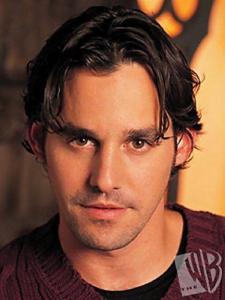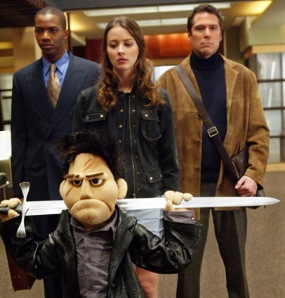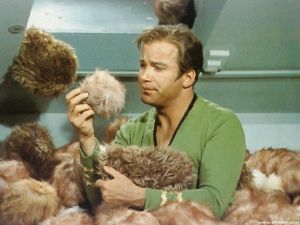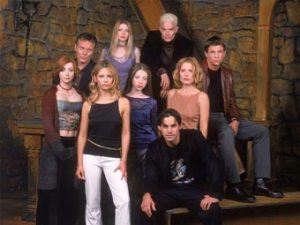As the next of my series featuring fantastic female fantasy authors (see disclaimer) I’ve invited the talented Yvonne Navarro to drop by.
Watch out for the give-away question at the end of the interview.
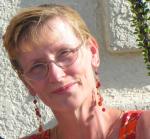 Q: You originally wanted to be an artist. I’ve done some surveys of writers and found four out of five are aural – they listen to music when writing, but the other one out of five are visually – they collect images and ideas spring from visual sources. Do you collect images that haunt you and trigger ideas? When you write a book do you collect a file of images that you associate with that book?
Q: You originally wanted to be an artist. I’ve done some surveys of writers and found four out of five are aural – they listen to music when writing, but the other one out of five are visually – they collect images and ideas spring from visual sources. Do you collect images that haunt you and trigger ideas? When you write a book do you collect a file of images that you associate with that book?
I did, although I currently consider myself as a “sort-of” artist now. I’m lucky enough to be at a point in my life where I can go back and actively chase a dream that might have otherwise slipped away. I’ve finally taken some painting classes and collected some output, and we’re perhaps a month away from me having a formal art studio in which to work. I guess that answers your question in a roundabout way—I’m a very visual person. As that applies to writing, you hit it on the proverbial head: I collect all kinds of images. Sometimes the images inspire me, sometimes I seek them out to go with a work already in progress. When I wrote Mirror Me, I had a notebook with photographs of the characters, neighbourhoods, even the kind of furniture in some of the characters’ homes. Now that I think of it, going all the way back to my first novel, AfterAge , I did the same thing but for the city itself– I got up on Sunday mornings and went downtown in the dark so I could take photographs of a completely empty downtown and get the “feel” of what Chicago might be like if it was empty of people.
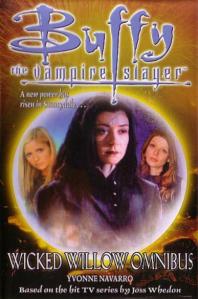 Q: You’ve written four books in the ‘Buffyverse’ and contributed to three anthologies. I know a couple of authors who write for Starwars, or Stargate, or the Buffyverse. It always strikes me as taking a lot of discipline. You must need to immerse yourself so thoroughly in the Buffyverse that writing those characters becomes instinctive. Do you do a lot of research before you start?
Q: You’ve written four books in the ‘Buffyverse’ and contributed to three anthologies. I know a couple of authors who write for Starwars, or Stargate, or the Buffyverse. It always strikes me as taking a lot of discipline. You must need to immerse yourself so thoroughly in the Buffyverse that writing those characters becomes instinctive. Do you do a lot of research before you start?
Actually, I’ve written seven when you include the Wicked Willow Trilogy. It’s been awhile since I’ve written a Buffyverse book, but I can say that I did research as necessary when I was involved in the projects, specifically to make sure I kept all the details and interactions correct. However, I was definitely immersed in the Buffy universe, in that completely geeky way that someone lives and breathes a series or movie that they absolutely adore. (I was the same way with Babylon 5.) I can still quote lines from Buffy shows (“Those are my chicken feet!”), just as I can from certain Aliens movies. :o)
Q: You have an impressive list of awards and nominations to your credit. Several final-listings in the Bram Stoker Award, a win for the Women In Publishing Award and a win in the National Federation Press Women’s Award in the Juvenile book category, to name a few. I guess the champagne corks have been popping in your house. Does it help to raise an author’s profile when they place or win in these awards?
 Perhaps, although I haven’t really been aware of it. Willow Files, Vol. 2 won the Bram Stoker Award in the category of Young Adult Fiction, and yet it was the last YA book I wrote until co‑writing a YA adventure with my husband, Weston Ochse. I will say that it’s awfully nice to have all your hard work recognized publicly. Hopefully there’s a certain ex out there somewhere who sees it and gets a silent moment of “She told me so.” Oh, wait—was that my out loud voice?!
Perhaps, although I haven’t really been aware of it. Willow Files, Vol. 2 won the Bram Stoker Award in the category of Young Adult Fiction, and yet it was the last YA book I wrote until co‑writing a YA adventure with my husband, Weston Ochse. I will say that it’s awfully nice to have all your hard work recognized publicly. Hopefully there’s a certain ex out there somewhere who sees it and gets a silent moment of “She told me so.” Oh, wait—was that my out loud voice?!
Q: You’ve also written for Species and Ultraviolet. Does this mean that you see the movie before it is released, or do you work from the script? What happens if scenes get left out on the cutting room floor?
 How interesting that you chose Species and Ultraviolet, which were polar opposite experiences for me! First off, all of the movie tie‑ins are written from the script, before the movie is released. The object is generally to get the book out preferably before the movie is released, or at the very least, at the same time. With Species, I worked very closely with Dennis Feldman, the scriptwriter, and we had the best time. He actually read the manuscript and would call me directly and make comments; by the same token, I could call him anytime and ask questions. One particularly telling question he asked me after reading the manuscript was, “What about the bus stop scene?” To which I replied, “What bus stop scene?” This, apparently, was something that had been added into an updated version of the script after I’d already written the first draft of the book.
How interesting that you chose Species and Ultraviolet, which were polar opposite experiences for me! First off, all of the movie tie‑ins are written from the script, before the movie is released. The object is generally to get the book out preferably before the movie is released, or at the very least, at the same time. With Species, I worked very closely with Dennis Feldman, the scriptwriter, and we had the best time. He actually read the manuscript and would call me directly and make comments; by the same token, I could call him anytime and ask questions. One particularly telling question he asked me after reading the manuscript was, “What about the bus stop scene?” To which I replied, “What bus stop scene?” This, apparently, was something that had been added into an updated version of the script after I’d already written the first draft of the book.  That he and I were able to talk back and forth like that is a real rarity in the world of movie tie‑ins, and it really helped to make the book the best it could be. Folks who read tie‑ins know that the best thing to do is to see the movie first, then read the book. Invariably things are cut from the movie script because of time and money; if you read about them first and then see the movie, you’ll be disappointed that they aren’t included. If you see the movie, then read about them in the book, you’ll be delighted at the extra stuff in the book. Which, by the way, isn’t just deleted scenes—authors often include past history, universe‑building, and detailed characterization.
That he and I were able to talk back and forth like that is a real rarity in the world of movie tie‑ins, and it really helped to make the book the best it could be. Folks who read tie‑ins know that the best thing to do is to see the movie first, then read the book. Invariably things are cut from the movie script because of time and money; if you read about them first and then see the movie, you’ll be disappointed that they aren’t included. If you see the movie, then read about them in the book, you’ll be delighted at the extra stuff in the book. Which, by the way, isn’t just deleted scenes—authors often include past history, universe‑building, and detailed characterization.
Ultraviolet was interesting because I never received a single comment or change request on the manuscript. I know I’m not a perfect writer, and that’s happened to me a couple of times (it also happened with Hellboy), but feedback is always a good thing, you know?
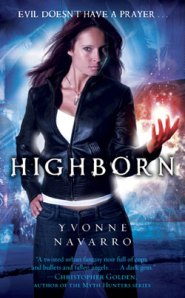 Q: In a review of your book Highborn, the reviewer said: ‘The term ‘Urban Fantasy’ can strike fear into the heart of many people, and not in a good way. Thankfully, this first novel in Yvonne Navarro’s Dark Redemption series (which is now followed by CONCRETE SAVIOR) is an example of the genre not only done well, but done damn near to perfection.’ They go on to say that the book is refreshing. Was it hard to come up with a fresh take on this genre?
Q: In a review of your book Highborn, the reviewer said: ‘The term ‘Urban Fantasy’ can strike fear into the heart of many people, and not in a good way. Thankfully, this first novel in Yvonne Navarro’s Dark Redemption series (which is now followed by CONCRETE SAVIOR) is an example of the genre not only done well, but done damn near to perfection.’ They go on to say that the book is refreshing. Was it hard to come up with a fresh take on this genre?
I remember that review, and to say I feel flattered by those nice words would definitely be an understatement. But I also have to admit that I wasn’t aiming to write an urban fantasy. When I thought of the basis for HIGHBORN and then planned it out, it was just the book I wanted to write. It wasn’t specifically geared to any genre, and it wasn’t until my agent sold it and the purchasing editor called it an urban fantasy that I even thought about where it might fit in terms of sales.
 Q: You’ve written over a hundred short stories. It looks like you are most comfortable writing what is called Dark Fantasy now, but used to be known as horror. What’s led you down this path? Did you discover Poe when you were thirteen and have never been the same since?
Q: You’ve written over a hundred short stories. It looks like you are most comfortable writing what is called Dark Fantasy now, but used to be known as horror. What’s led you down this path? Did you discover Poe when you were thirteen and have never been the same since?
My Mom and sister always liked scary stories. I grew up watching Creature Features, reading Creepy and Eerie magazines, and looking for the spookiest fiction I could find in the library. The first movie I remember watching was Alfred Hitchcock’s “The Birds” at the drive-in. I like a good, scary story because it gets your blood running and your mind working, and you don’t always know there’s going to be a happy ending.
 Q: I was prompted to start this series of interviews because there seems to be a perception in the US and the UK that fantasy is a bit of a boy’s club. Do you think there’s a difference in the way males and females write fantasy?
Q: I was prompted to start this series of interviews because there seems to be a perception in the US and the UK that fantasy is a bit of a boy’s club. Do you think there’s a difference in the way males and females write fantasy?
I think people write the way they want to, and if there’s any difference, it’s because the writer does it intentionally. There are men writing romances under pseudonyms and women writing crime thrillers using their first and middle initials whose own readers don’t realize are female. If a woman believes she shouldn’t write about certain things because she’s a woman, she’s imposed restrictions on herself… and she’s the only person who can break those chains. I don’t write like a woman. I don’t write like a man. I write like a writer.
Q: Following on from that, does the gender of the writer change your expectations when you pick up their book?
No, but I know that it does for some people.
Q: And here’s the fun question. If you could book a trip on a time machine, where and when would you go, and why?
Well, it’s tempting to say I’d go backward and fix a few of my bigger mistakes in life, but then I’d probably just make different ones, right? I tend to look at that on more of a personal basis than you’re probably intending. If I stick to the fun side of things, I think I’d like to go into the future a hundred years or so, just to see where technology has taken us. Of course, a thousand years from now we might actually have space travel. Hmmmm…
Give-away Question:
Who’s your favorite female movie star heroine, and from what movie?
Yvonne says: If I was to answer this, it would be a tie between Sigourney Weaver from Aliens and Kate Beckinsale from the Underworld movies.
Follow Yvonne on Twitter: http://twitter.com/#!/YvonneNavarro
See Yvonne’s Blog and Website.
Catch up with Yvonne on Facebook.
Catch up with Yvonne on GoodReads.









